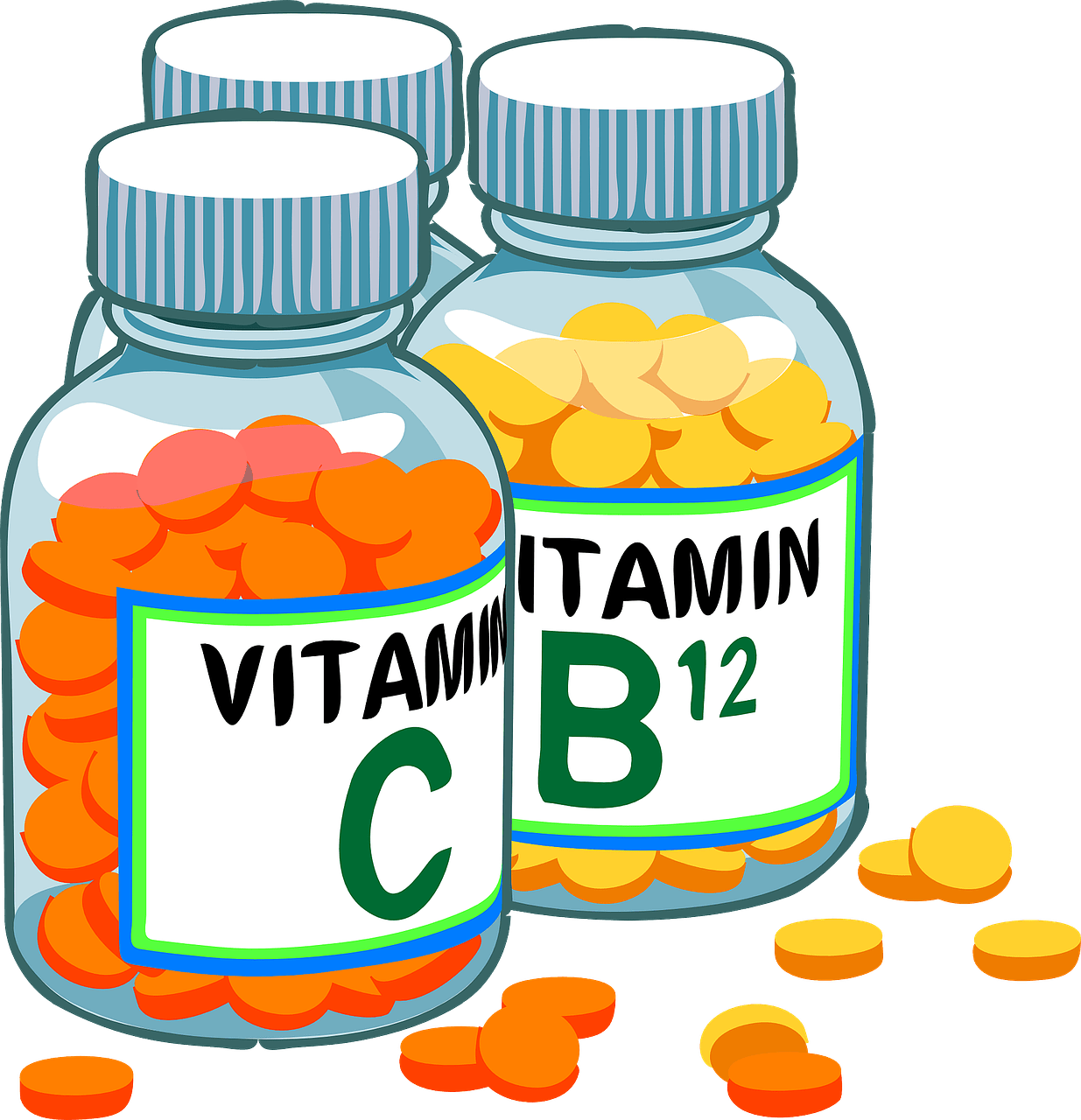Ever wondered why some vitamins need to be taken with a meal while others can be consumed on an empty stomach? The key lies in understanding the distinction between water-soluble vitamins and fat-soluble vitamins. Water-soluble vitamins, like vitamin C and the B-complex vitamins, dissolve easily in water and are not stored in the body, which means they need to be replenished daily. On the other hand, fat-soluble vitamins, such as vitamins A, D, E, and K, are stored in the body’s fat tissues and can be stored for longer periods. This article explores the differences between these two types of vitamins, explaining their unique characteristics and highlighting why it is important to be mindful of these distinctions.

Definition of Water-Soluble Vitamins
Water-soluble vitamins are a group of vitamins that dissolve in water and are not stored in the body for long periods of time. This means that you need to consume them regularly, as they are not stored in significant amounts. The human body does not have the ability to produce these vitamins on its own, so it relies on external sources such as diet and supplements to obtain them.
Explanation of Water-Soluble Vitamins
Water-soluble vitamins include vitamin C and the B-complex vitamins, which include thiamin (B1), riboflavin (B2), niacin (B3), pantothenic acid (B5), pyridoxine (B6), biotin (B7), folic acid (B9), and cobalamin (B12). These vitamins are essential for various physiological processes in the body, including energy production, metabolism, immune function, and cell growth.
Examples of Water-Soluble Vitamins
Examples of water-soluble vitamins include:
-
Vitamin C: Found in citrus fruits, berries, peppers, and leafy greens. It is important for collagen synthesis, immune function, and the protection of cells against oxidative damage.
-
B-complex vitamins: Found in whole grains, legumes, nuts, seeds, and animal products. Each B vitamin has its own unique functions. For example, thiamin is involved in energy metabolism, riboflavin plays a role in cellular respiration, and folic acid is important for DNA synthesis and cell division.
How Water-Soluble Vitamins Function in the Body
Water-soluble vitamins play crucial roles in the body’s metabolism. They act as coenzymes, which means they assist enzymes in carrying out chemical reactions that are necessary for various processes. These vitamins are involved in the synthesis of DNA, RNA, and proteins, as well as the breakdown of carbohydrates, fats, and proteins to produce energy. Additionally, water-soluble vitamins support the immune system, help maintain healthy skin, and promote the production of red blood cells.
Definition of Fat-Soluble Vitamins
Fat-soluble vitamins, as the name suggests, are vitamins that can dissolve in fats and are stored in the body’s fatty tissues and liver. Unlike water-soluble vitamins, fat-soluble vitamins can be stored in the body for longer periods of time, which means that excessive intake can lead to toxicity.
Explanation of Fat-Soluble Vitamins
Fat-soluble vitamins encompass four vitamins: A, D, E, and K. These vitamins are absorbed in the small intestine and require dietary fat for proper absorption. They are usually found in foods that contain fats or oils. Unlike water-soluble vitamins, fat-soluble vitamins are not readily excreted and can accumulate in the body.
Examples of Fat-Soluble Vitamins
Examples of fat-soluble vitamins include:
-
Vitamin A: Found in animal products such as liver, eggs, and dairy products, as well as in orange and yellow fruits and vegetables. It is essential for vision, immune function, and the growth and development of cells.
-
Vitamin D: Synthesized in the skin when exposed to sunlight, and also found in fatty fish, fortified dairy products, and egg yolks. Vitamin D is crucial for bone health, as it aids in the absorption of calcium and phosphorus.
-
Vitamin E: Found in nuts, seeds, vegetable oils, and leafy greens. Vitamin E acts as an antioxidant, protecting cells from damage caused by free radicals.
-
Vitamin K: Found in leafy greens, vegetable oils, and fermented foods. It plays a key role in blood clotting and bone health.
How Fat-Soluble Vitamins Function in the Body
Fat-soluble vitamins have diverse functions in the body. Vitamin A is essential for vision and the health of epithelial tissues, which line the surfaces of organs and body cavities. Vitamin D regulates calcium and phosphorus metabolism, helping to maintain bone health. Vitamin E acts as an antioxidant, protecting cell membranes from oxidative damage. Lastly, vitamin K is necessary for blood clotting and bone mineralization.
Structural Differences between Water-Soluble and Fat-Soluble Vitamins
Differences in Molecular Structure
The main difference between water-soluble and fat-soluble vitamins lies in their molecular structure. Water-soluble vitamins are composed of various chemical groups, including hydroxyl and amino groups, that allow them to dissolve in water. In contrast, fat-soluble vitamins are composed of long hydrocarbon chains, which make them soluble in fats and oils but insoluble in water.
Solubility in Water and Fats
As their names suggest, water-soluble vitamins readily dissolve in water, forming aqueous solutions. This solubility allows them to be transported easily throughout the body via the bloodstream. On the other hand, fat-soluble vitamins do not dissolve in water but instead require dietary fat for proper absorption. They can be stored in the body’s fatty tissues, where they are released slowly over time.
How This Affects Absorption and Storage in the Body
The differences in solubility have implications for how water-soluble and fat-soluble vitamins are absorbed and stored in the body. Water-soluble vitamins are absorbed directly into the bloodstream through the walls of the small intestine and are not stored to a significant extent. Any excess amounts are excreted in the urine. In contrast, fat-soluble vitamins are absorbed along with dietary fats through the lymphatic system. They can be stored in the liver and fatty tissues, where they are released as needed.
Sources of Water-Soluble Vitamins
Foods Rich in Water-Soluble Vitamins
A balanced diet consisting of a variety of foods is important for obtaining water-soluble vitamins. Some examples of foods that are rich in water-soluble vitamins include:
-
Citrus fruits such as oranges and grapefruits: These are high in vitamin C.
-
Leafy greens such as spinach and kale: These are a good source of folic acid and other B vitamins.
-
Legumes like lentils and beans: These are rich in thiamin, riboflavin, niacin, and other B vitamins.
-
Whole grains and fortified cereals: These provide various B vitamins.
Supplements for Water-Soluble Vitamins
If you have difficulty obtaining enough water-soluble vitamins through your diet, supplements can be a convenient option. It is important to note, however, that supplements should not replace a healthy diet but rather complement it. Talk to your healthcare provider before starting any vitamin or mineral supplements to ensure they are appropriate for you.
Importance of a Balanced Diet for Obtaining These Vitamins
A balanced diet that includes a variety of fruits, vegetables, whole grains, and lean proteins is crucial for obtaining adequate amounts of water-soluble vitamins. These vitamins are easily destroyed by heat, light, and air, so consuming fresh, minimally processed foods is ideal. Eating a diverse range of foods ensures you are getting the necessary nutrients and helps prevent deficiencies.

Sources of Fat-Soluble Vitamins
Foods Rich in Fat-Soluble Vitamins
Fat-soluble vitamins are mainly found in foods that contain fats and oils. Some examples of foods that are rich in fat-soluble vitamins include:
-
Fatty fish such as salmon, mackerel, and sardines: These are a great source of vitamin D and omega-3 fatty acids.
-
Liver and other organ meats: These are high in vitamin A.
-
Dairy products: Milk, cheese, and butter contain small amounts of vitamin A and vitamin D.
-
Nuts, seeds, and vegetable oils: These provide vitamin E.
-
Leafy greens and broccoli: These vegetables contain vitamin K.
Importance of Dietary Fat for Their Absorption
Fat-soluble vitamins require dietary fat for proper absorption. When you consume foods containing fat-soluble vitamins, the dietary fats help solubilize these vitamins and facilitate their absorption in the small intestine. Therefore, it is important to consume foods that contain healthy fats along with fat-soluble vitamins to maximize their absorption.
Risks of Excessive Intake Leading to Toxicity
While it is important to obtain adequate amounts of fat-soluble vitamins, excessive intake can lead to toxicity. Because these vitamins are stored in the body, high levels can accumulate over time. This can have negative effects on health. It is important to follow the recommended daily intake guidelines and avoid consuming excessive amounts of fat-soluble vitamins through supplements or fortified foods without medical guidance.
Absorption and Transportation in the Body
How Water-Soluble Vitamins Are Absorbed
Water-soluble vitamins are absorbed directly into the bloodstream through the walls of the small intestine. They do not require specific carriers or transport mechanisms for absorption. Once in the bloodstream, they are circulated throughout the body to be utilized by cells.
Transport Mechanisms in the Bloodstream
Water-soluble vitamins rely on transport proteins to facilitate their movement in the bloodstream. These transport proteins bind to the vitamins and carry them to their target tissues. Once the vitamins reach their destination, they are taken up by the cells and utilized for various metabolic processes.
Excretion of Excess Water-Soluble Vitamins
Water-soluble vitamins that are not immediately used by the body are excreted via the kidneys into the urine. Unlike fat-soluble vitamins, water-soluble vitamins do not accumulate in the body and are generally eliminated within a few hours to a few days. This is why it is important to regularly consume water-soluble vitamins through diet.

Absorption and Storage in the Body
How Fat-Soluble Vitamins Are Absorbed
Unlike water-soluble vitamins, fat-soluble vitamins require more complex processes for absorption. They are absorbed in the small intestine along with dietary fats. Bile acids, which are produced by the liver and stored in the gallbladder, play a crucial role in this absorption process. Bile acids solubilize the fat-soluble vitamins, enabling them to be absorbed into the lymphatic system.
Role of Bile Acids in Absorption
Bile acids are essential for the absorption of fat-soluble vitamins. They emulsify dietary fats, including fat-soluble vitamins, in the small intestine, forming micelles that are readily absorbed by the cells lining the small intestine. The absorbed fat-soluble vitamins are then transported through the lymphatic system before eventually entering the bloodstream.
Storage in Liver and Fatty Tissues
Once absorbed, fat-soluble vitamins are transported in the lymphatic system and eventually make their way to the liver. The liver stores significant amounts of fat-soluble vitamins, particularly vitamins A and D. The remaining vitamins are stored in fatty tissues throughout the body. This storage allows the body to have a reserve of fat-soluble vitamins that can be utilized during periods of inadequate intake.
Bioavailability and Bioactivity
Factors Influencing Bioavailability of Vitamins
The bioavailability of vitamins refers to the extent to which they are absorbed and utilized by the body. In general, water-soluble vitamins have higher bioavailability than fat-soluble vitamins. Bioavailability can be influenced by various factors, including the form of the vitamin, the presence of other nutrients, individual variations in absorption, and the cooking or processing of foods.
Bioactivity and Importance of Conversion
Once absorbed, vitamins need to be converted into their active forms to exert their biological activity. This conversion process occurs in various tissues and is influenced by enzymatic reactions. For example, vitamin D undergoes a series of transformations in the liver and kidneys to become its active form, which is crucial for calcium absorption and bone health.
Differences in Storage and Excretion Rates
The storage and excretion rates of water-soluble and fat-soluble vitamins differ significantly. Water-soluble vitamins are not stored in significant amounts and are readily excreted in the urine. In contrast, fat-soluble vitamins can be stored in the body’s tissues, particularly the liver and fatty tissues. This storage allows for a reserve supply of fat-soluble vitamins, but it also increases the risk of toxicity with excessive intake.
Recommended Daily Intakes
Daily Intake Levels for Water-Soluble Vitamins
The recommended daily intake levels for water-soluble vitamins can vary depending on age, sex, and life stage. Here are the general Recommended Dietary Allowances (RDAs) for some water-soluble vitamins:
-
Vitamin C: RDA varies from 75-120 mg for adults, with higher needs during pregnancy and lactation.
-
B-Complex Vitamins: RDAs vary for each individual B vitamin. For example, the RDA for thiamin ranges from 0.9-1.2 mg, while the RDA for vitamin B12 is 2.4 mcg.
It is important to note that these values can change based on individual needs and specific health conditions. Consulting with a healthcare professional can help determine the appropriate intake levels for you.
Daily Intake Levels for Fat-Soluble Vitamins
Similar to water-soluble vitamins, the recommended daily intake levels for fat-soluble vitamins vary depending on age, sex, and life stage. Here are the general RDAs for some fat-soluble vitamins:
-
Vitamin A: RDA ranges from 600-900 mcg for adults, with higher needs during pregnancy and lactation.
-
Vitamin D: RDA varies from 600-800 IU (international units) for adults, with higher needs for older adults.
Again, it is important to note that individual needs may vary. Consult with a healthcare professional to determine the appropriate intake levels for you.
Implications of Deficiencies and Excess Intake
Deficiencies or excessive intake of both water-soluble and fat-soluble vitamins can have significant implications for health. Deficiencies can lead to specific deficiency-related diseases. For example, vitamin C deficiency can cause scurvy, whereas vitamin D deficiency can lead to rickets in children and osteomalacia in adults. On the other hand, excessive intake of fat-soluble vitamins, particularly vitamins A and D, can result in toxicity, leading to various adverse effects on health. Striking the right balance and meeting the recommended intake levels is essential for overall health.
Impact on Health and Nutrition
Role of Water-Soluble Vitamins in Energy Production
Water-soluble vitamins play a vital role in energy production within the body. They are involved in various metabolic processes, including the breakdown of carbohydrates, fats, and proteins to produce energy. B-complex vitamins, in particular, are essential for the conversion of food into usable energy. Insufficient intake of water-soluble vitamins can contribute to fatigue, decreased cognitive function, and impaired metabolism.
Benefits of Fat-Soluble Vitamins for Vision and Immunity
Fat-soluble vitamins have specific benefits for vision and immune function. Vitamin A is crucial for maintaining healthy vision, and deficiencies can lead to night blindness and other eye disorders. Vitamin D plays a significant role in immune function, and optimal levels are associated with a lower risk of infectious diseases. Adequate intake of fat-soluble vitamins supports overall health and wellbeing.
Implications for Overall Health and Wellbeing
Both water-soluble and fat-soluble vitamins are essential for overall health and wellbeing. Ensuring an adequate intake of these vitamins through a balanced diet is essential for maintaining optimal health. While supplements can be helpful in certain situations, they should not replace a healthy diet. It is always best to obtain vitamins and other essential nutrients from whole foods whenever possible.
Understanding the distinction between water-soluble and fat-soluble vitamins is key to making informed dietary choices and supporting your overall health and nutrition. By incorporating a wide variety of nutrient-rich foods into your diet and consulting with a healthcare professional, you can ensure that you are meeting your vitamin needs and promoting a healthy lifestyle.